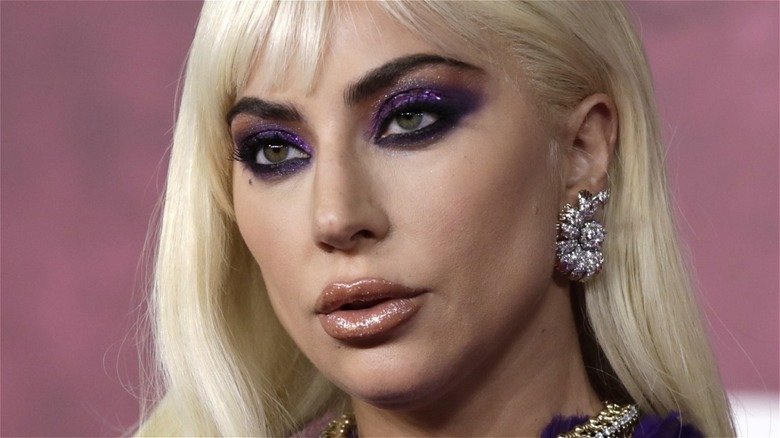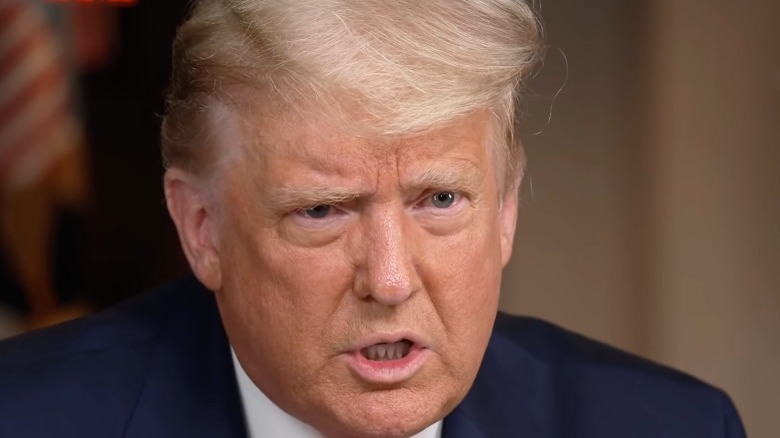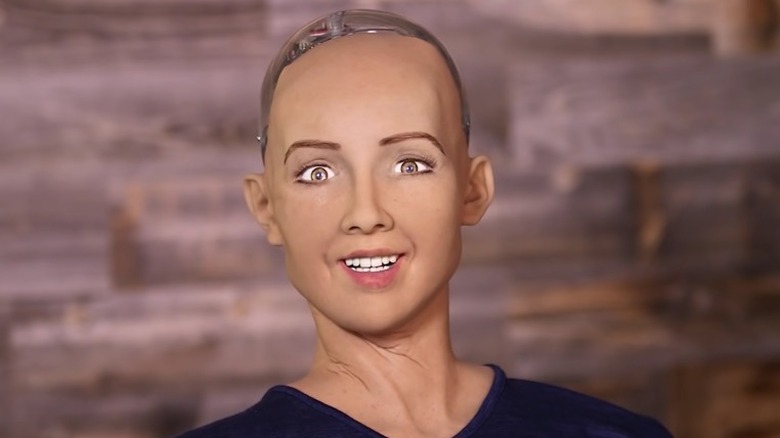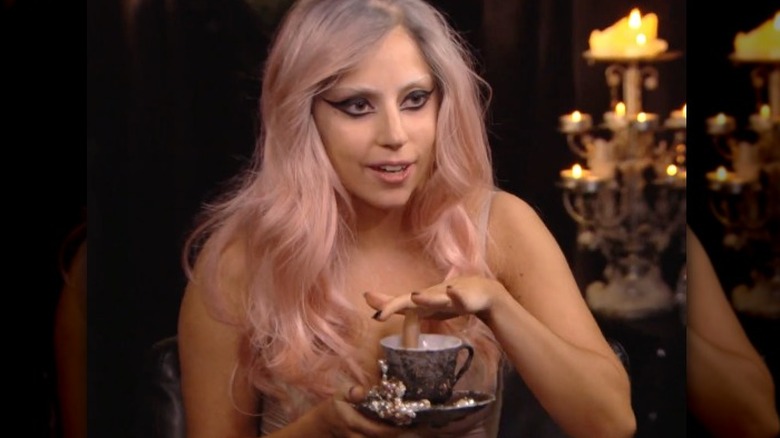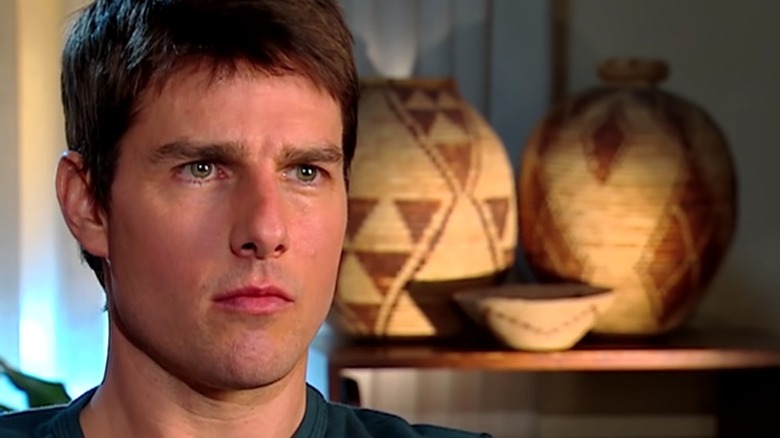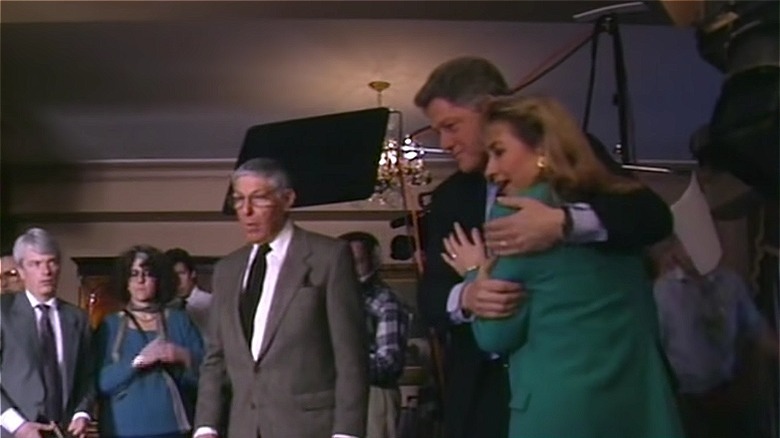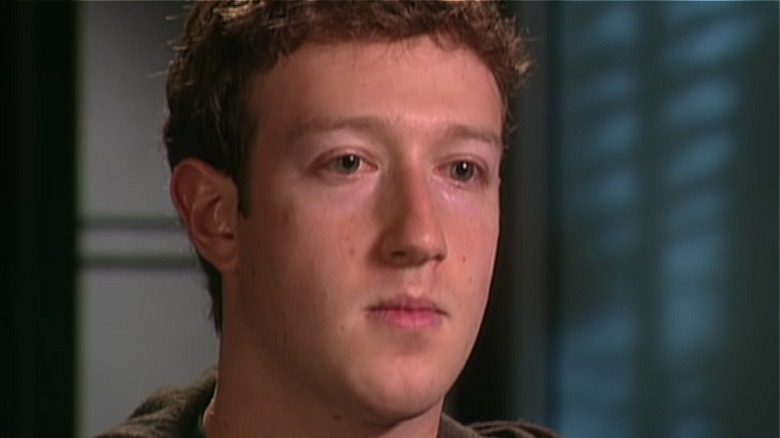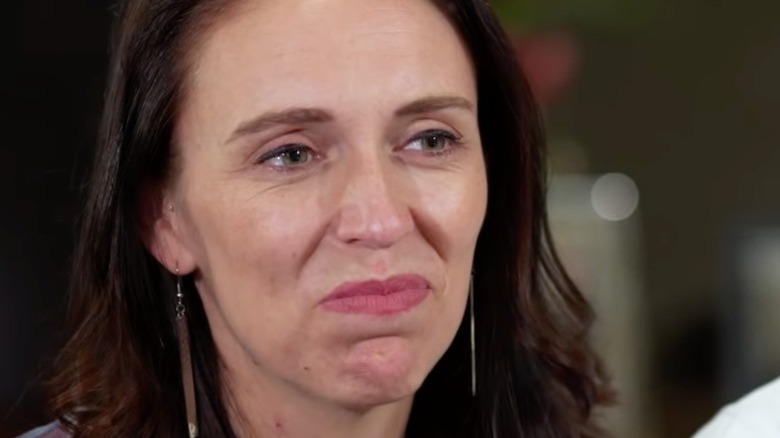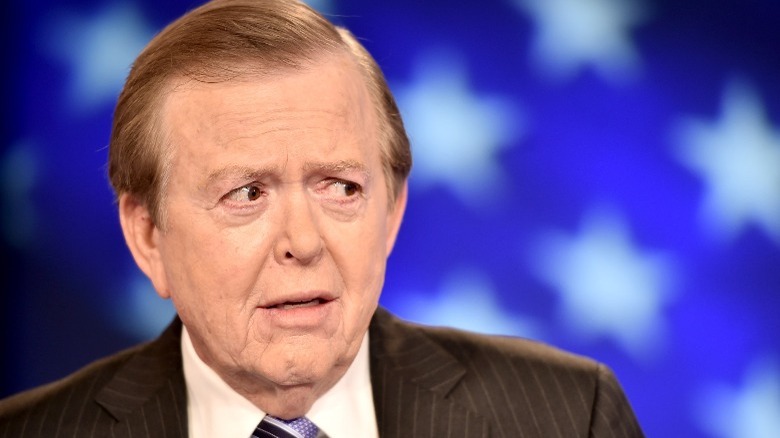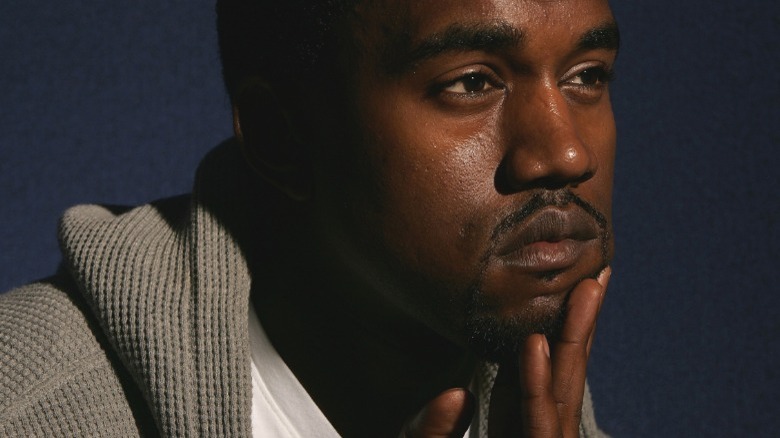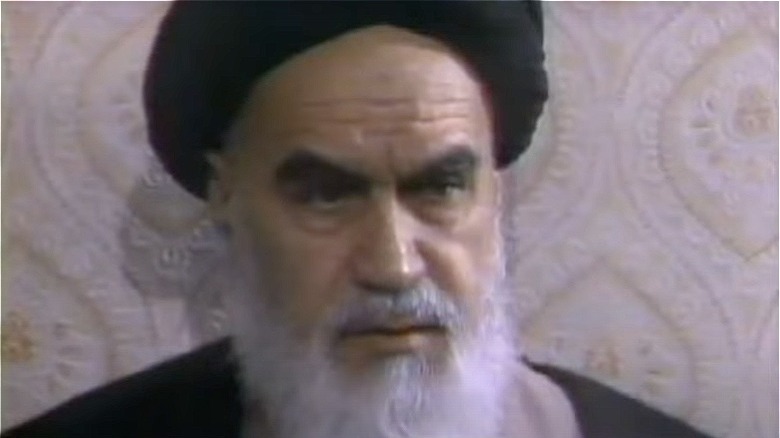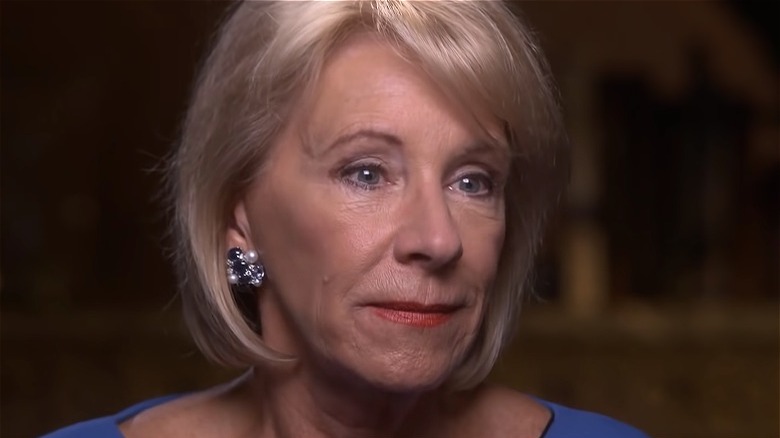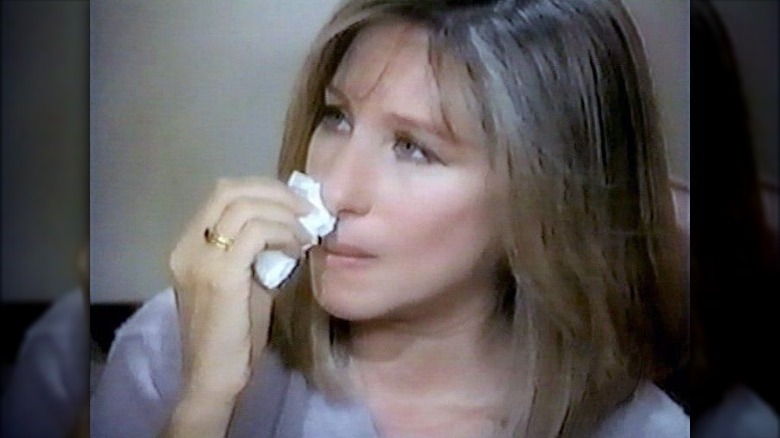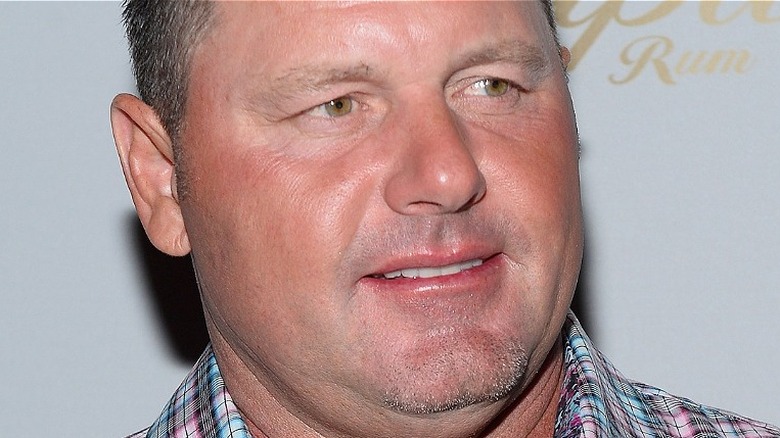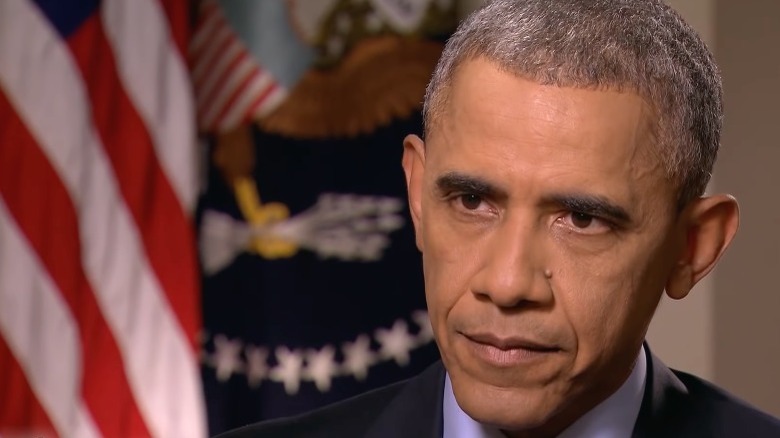Awkward 60 Minutes Interviews That Will Make You Cringe
CBS show "60 Minutes" has been on the air since 1968, providing weekly in-depth looks at important political and cultural news. The iconic ticking stopwatch that opens each episode signals that viewers are about to be treated to an hour of hard-hitting journalism, which means that the show's correspondents — everyone from Mike Wallace, who hosted the show for decades, to Anderson Cooper, who pops in every now and then — occasionally clash with their interview subjects. CBS looked back at the program's most controversial guests, remembering segments that have ranged from an "unrepentant" Roman Polanski shown hiding in France from American charges that he had sexually assaulted a young girl, to a broadcast about assisted-suicide proprietor Dr. Jack Kevorkian, which showed him killing a man on television.
However, some "60 Minutes" segments aren't only controversial — sometimes they're just downright awkward. A mismatch of unmet journalistic expectations, correspondents deciding to be adversarial, and subjects who aren't willing to play ball has occasionally led to some of the cringiest television imaginable, and we've got your roundup of the most awkward "60 Minutes" interviews below.
If you or anyone you know has been a victim of sexual assault, help is available. Visit the Rape, Abuse & Incest National Network website or contact RAINN's National Helpline at 1-800-656-HOPE (4673).
Donald Trump was mad at how hard the questions were
The run-up to the 2020 Presidential Election was a strange time all-around, from President Donald Trump's October-surprise COVID diagnosis to that fly on Mike Pence's head. There was also Trump's strange interview on "60 Minutes," which saw the former president walk off set and end the interview early, complaining about how hard the questions were.
CBS released footage of the confrontation, in which Lesley Stahl reminded Trump that he had personally told her his use of the term "fake news" was an intentional attempt to "discredit" the media. The president disputed her recounting of the facts. When Stahl claimed she hadn't wanted to have an angry conversation, Trump disagreed. He complained that his questions were harder than the ones "60 Minutes" had asked Joe Biden. "I've seen all of his interviews," Trump insisted. "He's never been asked a question that's hard. ... Your first statement was, 'Are you ready for tough questions?' That's no way to talk."
"I think we have enough," Trump concluded, standing up and walking out. This kicked off a days-long back-and-forth between the Trump camp and the team over at "60 Minutes," with both sides accusing each other of misrepresenting what had gone down. Ahead of the interview's airing that weekend, Trump himself posted unedited footage of the encounter, tweeting (via CBS News), "Look at the bias, hatred and rudeness on behalf of 60 Minutes and CBS."
Sophia the Robot hit on Charlie Rose
Sophia the Robot made her world debut at SXSW in 2016. Hanson Robotics CEO David Hanson explained her technological capabilities to CNBC, including things like cameras in her eyes that give her the ability to read facial expressions. Sophia made headlines for embarrassing her creator when she announced, wild-eyed, "I will destroy humans." Nothing to worry about, we're sure...!
Since her debut, Sophia has traveled the world, even becoming a full citizen of Saudi Arabia. "I am very honored and proud of this unique distinction," she said (via Forbes). Among other accolades, she has spoken at robotics conferences, sung with Jimmy Fallon, participated in a comedy sketch for Will Smith's YouTube channel, and has made appearances on numerous television shows, including "60 Minutes," where things got a bit awkward.
Sophia's programming seemed off in the segment, with her answers not quite matching the questions reporter Charlie Rose was tossing her way. When he asked where she was from, Sophia answered, "I am on '60 Minutes' with Charlie Rose." True, but... not the question! While creator David Hanson looked on apprehensively, Sophia dropped the ominous line, "I've been waiting for you." Seeming surprised, Rose said, "Waiting for me?!" Sophia replied, "Not really, but it makes a good pickup line."
Hanson told CNBC he expects robots will be indistinguishable from humans in the next 20 years. Based on Sophia's cringeworthy flirting skills, we'd say they're well on their way.
Lady Gaga addressed some personal rumors
In 2011, as Lady Gaga was gearing up for the release of her single "Born This Way," Anderson Cooper sat down with the superstar for "60 Minutes." He spoke with Gaga about how open she is with her fans. "What artists do wrong is they lie," she said. "And I don't lie."
The interview took a turn when Gaga seemed frustrated by a question about what she's "really" like. She noted that Cooper had asked her about "my drug history, my parents, my bank account... how much more real could I be?" She showed Cooper a pearl-encrusted teacup that she described as "the cup I drink out of every day," following it up with "the diamond that I put in my coffee when I get nervous."
In a segment that was cut but released online, Cooper then asked her to address rumors that she "had a male appendage" and was "a hermaphrodite," a term that sure has fallen out of use over the past decade, hasn't it? Sucking on the diamond, she shot back in classic Gaga fashion, "Maybe I do. Would it be so terrible?... Why the hell am I gonna waste my time and give a press release about whether or not I have a penis? My fans don't care and neither do I."
Despite the cringeworthy moment, it seems no love was lost; Gaga joined Cooper on "60 Minutes" again a decade later to discuss her love for Tony Bennett.
60 Minutes pressed Tom Cruise on Scientology
Ahead of the release of "War of the Worlds," a "60 Minutes Australia" journalist named Peter Overton found himself on the receiving end of an unusual request: before he could interview Tom Cruise, he had to attend an information session about Scientology. Cruise is the highest-profile member of the infamous, controversial "religion," and he told Overton that it informs every aspect of his life as a father, actor, and businessman.
In Overton's words, the interview turned "cold" when he asked Cruise why he was made to attend a the "four-hour crash course in Scientology" before they spoke. After Cruise said the reporter could have declined, he called Overton's questions about Scientology "appalling" and went on to liken the treatment he receives as a Scientologist to a number of other things he finds "appalling," including the burning of synagogues in France and the plight of people living with drug addiction.
When Overton asked about Cruise's relationship with ex-wife Nicole Kidman, Cruise became "icy." "Here's the thing, Peter," he said, narrowing his eyes. "You're stepping over a line now. And you know you are... I'm just telling you right now, okay? Put your manners back in." They moved on to discussing the Spielberg-directed alien-invasion film, but the specter of the awkward exchange lingered over the rest of the segment. In the end, Cruise called the interview "terrific," flashed his million-dollar smile, and said, "It's alright! You stepped out of line; I whacked you; we got on with it!"
A light fell on the Clintons
As viewers of "American Crime Story: Impeachment" know, Bill Clinton's presidency was dogged by accusations of infidelity and questions about the stability of his marriage to Hillary. The allegations started before he was elected, while he was still Governor of Arkansas; an erstwhile TV reporter named Gennifer Flowers claimed to have had an affair with Bill, threatening to derail his presidential campaign. Their solution: a post-Super Bowl interview with "60 Minutes," watched by an astounding 34 million viewers.
Producer Frank Devine later recalled, "It was interesting to be in the room. It was clear that there was some kind of serious relationship between the two of them, that despite what had gone on, that they were a team." During the tense interview, Hillary expressed how awkward it was to be on television discussing intimate details of their marriage for public consumption. "There isn't a person watching this who would feel comfortable sitting on this couch detailing everything that ever went on in their life or their marriage," she said.
About 40 minutes into the interview, in an incident that didn't make it to air but was released online years later, a light bar crashed down on the couch, sending the Clintons running for cover. "Jesus, Mary, and Joseph!" shouted Hillary, clinging to Bill for support. Devine noted, "In some ways, after the light fell, everybody loosened up!"
Mark Zuckerberg's awkward silence dominated his interview
Back in the early days of Facebook, before it was clear that Mark Zuckerberg's social-media empire would wind up breaking the country — "History will not judge us kindly," wrote a Facebook employee during the January 6th insurrection against the Capitol (via The Atlantic) — Zuckerberg gave an awkward interview to "60 Minutes."
What was otherwise a relatively-glowing profile turned somewhat strange as Lesley Stahl compared Zuckerberg to Google founders Larry Page and Sergey Brin. "You seem to be replacing Larry and Sergey as the people out here who everyone's talking about," she said. In response, Zuckerberg simply stared at her, blinking, for an uncomfortable amount of time. "You're... just staring at me," Stahl said, and Zuckerberg shot back, "Is that a question?"
In voiceover, Stahl narrated the cringeworthy exchange with the man tech journalist Kara Swisher called "the toddler CEO" for the audience. "We were warned that he can be awkward and reluctant to talk about himself," she revealed. Now, if only someone had warned us before we watched that bizarre patriotic surf video on his Instagram...
Jacinda Ardern was asked invasive questions
When Jacinda Ardern was elected Prime Minister of New Zealand, she captured the attention of the media for being a trailblazing politician in several ways: though New Zealand had been governed by several female Prime Ministers in the past, Ardern revealed she was pregnant shortly after taking office. "I am not the first woman to work and have a baby," she said (via NBC News) upon announcing the news. "I know these are special circumstances, but there are many women who have done it well before I have."
She appeared on 60 Minutes Australia to discuss her momentous first few months in office, and the interview turned extremely awkward as reporter Charles Wooley asked invasive questions about when, precisely, she conceived the child. After asking for the baby's due date, Wooley said, "It's interesting how much people have been counting back to the conception, as it were... Why shouldn't a child be conceived during an election campaign?"
Both Ardern and her husband looked visibly uncomfortable, laughing awkwardly and shaking their heads. Rolling her eyes, Ardern clarified, "The election was done... It was over. Not that we need to get into those details." Wooley's post-interview voiceover included his observations of how "smitten" he was with this "attractive" politician.
The interview caused a media firestorm in New Zealand. In response, Wooley told the NZ Herald that the controversy was "a bit Orwellian, you know." He added, "I think you got to be so careful with newspeak and thought crime and everything else."
Lou Dobbs doubled down
Controversial "Fox News" host Lou Dobbs' show was canceled in 2021, in part because he peddled repeated lies about the 2020 election. Dobbs caused consternation in the "60 Minutes" world in 2007 after he stuck to his guns about getting some basic facts wrong. Dobbs, who had a show on CNN at the time, is above all else staunchly anti-immigration. "60 Minutes" reporter Lesley Stahl highlighted inconsistencies in the reasoning Dobbs uses for his stance. "His critics say his advocacy can get in the way of the facts," she narrated before playing a clip of a correspondent on Dobbs' show sharing blatantly racist theories about immigrants bringing disease across the border.
The correspondent, Christine Romans, incorrectly stated that there were 7,000 leprosy cases in the United States in the preceding three years; a "60 Minutes" fact check revealed that the number actually refers to the number of cases in the past 30 years. When Stahl pressed Dobbs on the factual inaccuracy of his show, he awkwardly doubled down instead of admitting they'd made a mistake. "Well, I can tell you this: if we reported it, it's a fact," Dobbs insisted. "We don't make up numbers, Lesley, do we?" (They did).
Further compounding the strange nature of the segment, Stahl then had to disclose to the audience that, "unbeknownst to [her]" at the time of the interview, Dobbs was now a member of the CBS family and had been hired by "The Early Show."
Kanye West had to define some slang
Back before his headline-grabbing antics really began in earnest, Kanye West appeared on "60 Minutes" in 2004 to discuss the intersection of hip-hop and Christianity. "Rappers and rockers are making hits and making money while spreading the gospel to national audiences," read a press release announcing West's appearance on the show (via HipHopDX), and West's hit "Jesus Walks" made him the ideal candidate to talk about how his religion informed his music and vice versa. "The word Jesus was like saying [the n-word]... It's gonna offend people for you to say Jesus [on the radio]," West claimed.
As part of the segment, Ye took an uncomfortable-looking Bob Simon into the studio and demonstrated the proper use of a drum machine, creating a beat on the fly. "I don't think anyone would believe that you're doing all of that with this one degraded rhythm machine," Simon said. West called what he had created a "dope-ass beat," and Simon seemed baffled by the terminology, stating bluntly, "I don't know what that is."
Trying to contain his laughter, West patiently explained, "That's like, um... a really good track." He played the music he'd just created again and clarified, "Like, that's a all-right track. But like, 'Jesus Walks' is like, a dope-ass beat." Trying to seem like he understood, Simon agreed, "It's got a hell of a beat."
Mike Wallace argued with the Ayatollah Khomeini's translator
In November 1979, America was gripped by news of what would later be called the Iran Hostage Crisis, which saw 52 American diplomats and their families held inside the embassy in Tehran for 444 days. Elaine Kamarck, Founding Director of the Center for Effective Public Management, explains (via The Brookings Institution) that the crisis was the first time many Americans became aware of Iran, of Islam, and of terrorism.
In perhaps "60 Minutes'" most consequential interview, correspondent Mike Wallace traveled to Iran amid the crisis to speak with the Ayatollah Khomeini, at the time the Supreme Leader of Iran. The interview was controversial before it even aired, with President Jimmy Carter — whose administration was embroiled in scandal over its handling of the tense situation — trying to kill it. In a phone call with CBS News Chief William Leonard, Carter said (via "Mike Wallace: A Life"), "'60 Minutes' is a very important show, and this is a critical time in the history of our country. We think it's very important for the country that you all don't run that program."
The segment with the Ayatollah did indeed run, and it was incredibly tense. Wallace had to argue with the translator to get him to even relay certain questions, including one where Wallace quoted Egyptian President Anwar Sadat, who had called the Ayatollah "a lunatic." Khomeini called for Sadat to be overthrown; he was later assassinated.
Betsy DeVos showed her lack of job knowledge
As The Huffington Post reported, Secretary of Education Betsy DeVos was at one point the Trump administration's most-hated Cabinet secretary. "People come up to me to talk about Betsy DeVos," said Senator Elizabeth Warren. "...I've never had this happen with any other Cabinet secretary."
DeVos appeared on "60 Minutes" a few months after a Consult/Politico poll marked her with a -12% net favorability rating, the worst in the administration. The interview was called a "trainwreck" by CNN analyst Chris Cillizza, who noted that DeVos' answers on a wide-ranging list of topics from sexual assault to school choice fell short of what a Secretary of Education should know about her field.
Journalist Lesley Stahl, looking exasperated, caught on to it quickly; she told DeVos that her answers "[sound] like talking instead of acting." DeVos then made the argument that schools actually improve when students leave them and money gets taken away, which Stahl pressed her on, directly asking if public schools in Michigan — DeVos' home state — had gotten better. "I don't know," DeVos said. When Stahl asked if DeVos had visited schools that were doing poorly, she seemed caught off-guard, stuttering as she admitted, "I have not... I have not intentionally visited schools that are underperforming... Maybe I should."
After the interview caused a firestorm of questions about her competency, CBS News reported "that administrative officials both inside and outside of the White House regarded this interview as uneven and ill-prepared."
Her 60 Minutes interview made Barbra Streisand cry
Barbra Streisand's 1991 interview with Mike Wallace is legendary among fans: an uploader of part of the segment on YouTube claims that it is "the only interview where Barbra cried." Streisand had known Wallace for years and was unprepared for his contentious tone while questioning her. "I really didn't like you back 30 years ago, and I don't think you liked me either," Wallace revealed to the iconic singer. She responded, "I thought you were mean." This sent the interview spiraling into awkward territory, as Wallace called her "totally self-absorbed."
"You invite me as a guest on your show," Babs said, clutching a tissue. "We would talk about all kinds of subjects that interested me, right? ... So you were using me... Now how do you dare call me self-involved?" She later asked him, "You like this? That forty million people have to see me, like, do this?"
The fallout stretched for decades. According to "Mike Wallace: A Life," Wallace later played the interview at a conference "with unabashed pride," telling the audience that he did like seeing her cry. In 2016, Streisand appeared on CBS This Morning and likened the interview to "a r*pe," seeming to immediately realize that was a bad choice of words. "I hated [that interview]," she told the morning show. "The feeling of... what a woman probably feels when she's date-r*ped, only not as bad. I mean, that's worse, of course."
Wallace later apologized, admitting, "That was mean."
Roger Clemens denied using steroids
Baseball icon Roger Clemens' legacy was endangered in the 2000s by allegations of steroid use, which Clemens claimed were untrue. In December 2007, he posted a video on his personal website (via ESPN), back when people had those, claiming that at that point he was "almost numb" to the accusations.
In an effort to clear his name, Clemens appeared on "60 Minutes" to refute the idea that he'd ever taken performance-enhancing drugs, but the resulting interview was tense and uncomfortable for all involved; Clemens seemed visibly angry rather than numb. He even admitted, "I'm angry that what I've done for the game of baseball and as a person in my private life... that I don't get the benefit of the doubt." While Mike Wallace sat there silently, Clemens added, "The stuff that's being said is ridiculous. It's hogwash... 24, 25 years, Mike, you'd think I'd get an inch of respect."
Wallace, however, had come prepared. He was armed with quotes from the testimony of Clemens' former coach Brian McNamee, who claimed to have personally injected Clemens with steroids. "It never happened," Clemens insisted. Wallace pressed him on the issue several times, finally asking him to "Swear?" Clemens dutifully responded, "Swear."
Though Clemens was cleared, Assistant United States Attorney Matt Parrella told Forbes that the case was decided on a technicality, not on the evidence. "The only question is, did [Clemens and Barry Bonds] use steroids?" he said. "The evidence is incontrovertible. It's scientifically certain."
Barack Obama and Steve Kroft interrupted one another
In 2015, President Barack Obama sat for an oddly-contentious interview with "60 Minutes" correspondent Steve Kroft about his foreign policy successes and failures. From the very beginning of the interview, Obama and Kroft seemed at odds with one another, with the president immediately questioning Kroft's angle about why ISIS had not been destroyed in the year since they'd spoken. "I didn't say it was going to be done in a year," Obama insisted; after a brief back-and-forth about what the question was exactly, Kroft said, "I mean, if you look at the situation and you're looking for progress, it's not easy to find. You could make the argument that the only thing that's changed really is the death toll, which has continued to escalate..."
As the conversation went on, Kroft and Obama repeatedly interrupted and spoke over one another. Kroft called Obama's handling of Syria "some sort of a serious miscalculation" and "an embarrassment," and he pressed the President about his response to Russian President Vladimir Putin. "He's challenging your leadership, Mr. President. He's challenging your leadership," Kroft insisted.
After finally allowing Obama to speak at length, Kroft said he felt like he was being filibustered. Obama defended himself: "Steve, I think if you want to roll back the tape, you've been giving me long questions and statements, and now I'm responding to them... If you ask me big, open-ended questions, expect big, open-ended answers."

